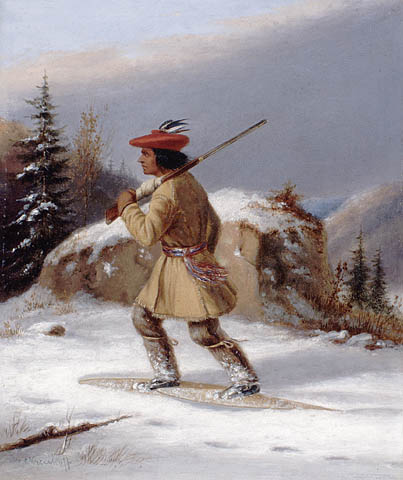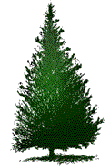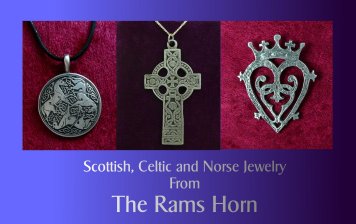HOME | home
The Holly and the Ivy | Cherry Tree Carol | Sans Day Carol | Gloucestershire Wassail | Seven Joys of Mary | Christ Child's Lullaby | Carol of the Beasts | Boar's Head Carol | I Saw Three Ships | Deck The Halls | Bleak Midwinter | There Is No Rose | King Jesus Hath a Garden | Baloo Lammy | O Come, O Come Emmanuel | The Carnal and the Crane | Hark the Harald Angels Sing | Straw Against the Chill | Good King Wenceslas | The Huron Carol | Shepherds Arise | The Shepherd's Carol | I Wonder as I Wander
The Huron Carol
Twas in the Moon of Wintertime
Written in 1643
by Jean de Brébeuf

Cornelius David Krieghoff, Indian Hunter, c. 1855
In 1926, Jesse Edgar Middleton wrote the English lyrics used today for the Anglican hymnal.


Twas in the moon of wintertime when all the birds had fled
That mighty Gitchi Manitou sent angel choirs instead;
Before their light the stars grew dim and wondering hunters heard the hymn,
Jesus your King is born, Jesus is born, in excelsis gloria.
Within a lodge of broken bark the tender babe was found;
A ragged robe of rabbit skin enwrapped his beauty round
But as the hunter braves drew nigh
the angel song rang loud and high
Jesus your King is born, Jesus is born, in excelsis gloria.
The earliest moon of wintertime is not so round and fair
As was the ring of glory on the helpless infant there.
The chiefs from far before him
knelt with gifts of fox and beaver pelt.
Jesus your King is born, Jesus is born, in excelsis gloria.
O children of the forest free,
O seed of Manitou
The holy Child of earth and heaven is born today for you.
Come kneel before the radiant boy
who brings you beauty peace and joy.
Jesus your King is born, Jesus is born, in excelsis gloria.

O na wateh wado:kwi nonnwa 'ndasqua entai
ehnau sherskwa trivota nonnwa 'ndi yaun rashata
Iesus Ahattonnia, Ahattonnia, Iesus Ahattonnia
yauntaun kanntatya hm-deh 'ndyaun sehnsatoa ronnyaun
Waria hnawakweh tond Yosehf sataunn haronnyaun
Iesus Ahattonnia, Ahattonnia, Iesus Ahattonnia
Tishyaun ayau ha'ndeh ta aun hwa ashya a ha trreh
aundata:kwa Tishyaun yayaun yaun n-dehta
Iesus Ahattonnia, Ahattonnia, Iesus Ahattonnia
avwa tateh dn-deh Tishyaun stanshi teya wennyau
aha yaunna torrehntehn yataun katsyaun skehnn
Iesus Ahattonnia, Ahattonnia, Iesus Ahattonnia
kiyeh kwanaun aukwayaun dehtsaun we 'ndeh adeh
tarrya diskwann aunkwe yishyehr eya ke naun sta
Iesus Ahattonnia, Ahattonnia, Iesus Ahattonnia
This version performed by Heather Dale, and sung in Wendat (Huron), French and English

TRANSLATION -- "Jesus, He is Born"
Have courage, you who are human beings: Jesus, he is born
The okie spirit who enslaved us has fled
Don't listen to him for he corrupts the spirits of our thoughts
Jesus, he is born
The okie spirits who live in the sky are coming with a message
They're coming to say, "Rejoice!
Mary has given birth. Rejoice!"
Jesus, he is born
Three men of great authority have left for the place of his birth
Tiscient, the star appearing over the horizon leads them there
That star will walk first on the bath to guide them
Jesus, he is born
The star stopped not far from where Jesus was born
Having found the place it said,
"Come this way"
Jesus, he is born
As they entered and saw Jesus they praised his name
They oiled his scalp many times, anointing his head
with the oil of the sunflower
Jesus, he is born
They say, "Let us place his name in a position of honour
Let us act reverently towards him for he comes to show us mercy
It is the will of the spirits that you love us, Jesus,
and we wish that we may be adopted into your family
Jesus, he is born

The "Huron Carol" (or "'Twas in the Moon of Wintertime") is a Canadian Christmas hymn (Canada's oldest Christmas song), written in 1643 by Jean de Brébeuf, a Jesuit missionary at Sainte-Marie among the Hurons in Canada. Brébeuf wrote the lyrics in the native language of the Huron/Wendat people; the song's original Huron title is "Jesous Ahatonhia" ("Jesus, he is born"). The song's melody is a traditional French folk song, "Une Jeune Pucelle" ("A Young Maid"). The well known English lyrics were written in 1926 by Jesse Edgar Middleton.
The English version of the hymn uses imagery familiar in the early 20th century, in place of the traditional Nativity story. This version diverts from Brebeuf's original song and Huron religious concepts. In the English version, Jesus is born in a "lodge of broken bark", and wrapped in a "robe of rabbit skin". He is surrounded by hunters instead of shepherds, and the Magi are portrayed as "chiefs from afar" that bring him "fox and beaver pelts" instead of the more familiar gold, frankincense, and myrrh. The hymn also uses a traditional Algonquian name, Gitchi Manitou, for God. The original lyrics are now sometimes modified to use imagery accessible to Christians who are not familiar with Native-Canadian cultures.
The song remains a common Christmas hymn in Canadian churches of many Christian denominations. Canadian singer Bruce Cockburn has also recorded a rendition of the song. It is also sung by Canadian musician Tom Jackson during his annual Huron Carole show.
In the United States, the song was included as "Jesous Ahatonia" on Burl Ives's 1952 album Christmas Day in the Morning and was later released as a Burl Ives single under the title "Indian Christmas Carol."

This carol page is dedicated to my friends Thomas and Colleen Kozlowski
of Barking Rock Farm
The Huron Carol


